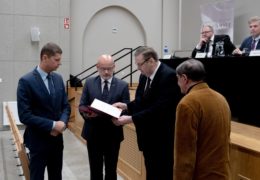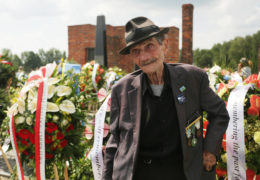
On 2 August, the European Roma Holocaust Memorial Day, the persecution and murder of Sinti and Roma during National Socialism was commemorated in the former Auschwitz-Birkenau concentration camp. At this year’s commemoration ceremony, the 75th anniversary of the murder of 4,300 Sinti and Roma on the night of 2 August, the governments of Poland, Germany and other countries as well as international organisations were represented at a high level.
The Central Council and the Documentation Centre of German Sinti and Roma organised the commemoration event with the Roma Association in Poland and in close cooperation with the Auschwitz-Birkenau State Museum.
With the speech of civil rights activist Rev. Jesse L. Jackson Sr., President of the Rainbow/PUSH Coalition (RPC), a representative of the US civil rights movement spoke for the first time at the commemoration ceremony. He emphasized the common ground of the US civil rights movement and the Sinti and Roma civil rights struggle against oppression and called for political resistance also in the future: It’s time to organize and fight back. If history has taught us anything, it is that where there is oppression, there will be resistance. People will go forward by hope and unity, not backwards by fear and division.”
The chairman of the Central Council of German Sinti and Roma, Romani Rose, stressed the importance of the US civil rights movement for Germany and Europe: “The American civil rights movement, which was shaped by people like Rosa Parks, Martin Luther King, Malcom X and for many decades by Reverend Jackson, was and is a model for Sinti and Roma in Germany and Europe. Their success continues to bear hope for minorities around the world who still suffer from racism and exclusion, violence and persecution.
Else Baker, Eva Fahidi and Nadir Dedic spoke for the survivors of the Holocaust. Else Baker was deported as a child from Hamburg to Auschwitz-Birkenau and later to Ravensbrück before her father succeeded in obtaining her release. In her speech, she called for the continued remembrance of the Holocaust and stressed the resulting responsibility: “The fates of the murdered and the survivors of the extermination camps must never be forgotten. All of us – the survivors of the extermination camps as well as those born after them – must stand up for human rights and democracy”.
Eva Fahidi, who had to observe the murder of the 4,300 Sinti and Roma on August 2 1944, recalled the desperate resistance of the prisoners: “They resisted with stones, with sticks, with objects that fell into their hands, screaming, cursing, shouting or praying. The SS set the dogs barking loudly at the people, they attacked the people, the desperation was great, the noise was terrible, the children cried for their mothers, the mothers tried to calm the children down”.
The survivor of the Jasenovac concentration camp, Nadir Dedic, called for a committed civil society in view of current developments in politics and society: “It is certainly not an easy life to look back on. But it is above all my view of the present and the future that causes me fear and worry. Whether Jasenovac or Auschwitz, we must never forget what happened! Stand up together for a life together based on mutual respect and not on hatred, contempt and exclusion”.
The commemoration ceremony concluded in the afternoon at the Centre for Prayer and Dialogue in Oswiecim with speeches by, among others, Minister of State Thomas Roth, EU Commissioner Vera Jourova and former Member of the European Parliament Soraya Post.
On the evening of August 1, the Roma and Sinti Philharmonic performed the composition “Requiem for Auschwitz” by the Dutch Sinto Roger Moreno Rathgeb in Krakow under the musical direction of Riccardo M Sahiti. The Requiem is dedicated to all victims of the Auschwitz extermination camp, which stands as a symbol for the genocide crimes of the National Socialists. The music keeps alive the memory of the suffering. Beyond remembering, the composer would like his work to serve international understanding and the respectful interaction of people with one another. The Roma and Sinti Philharmonic Orchestra was founded in 2002 to perform pieces of music rooted in the Roma and Sinti culture and to cultivate the musical heritage of the Roma and Sinti.
Verwandte Veranstaltungen:
Więźniów Oświęcimia 20, 32-600 Oświęcim




